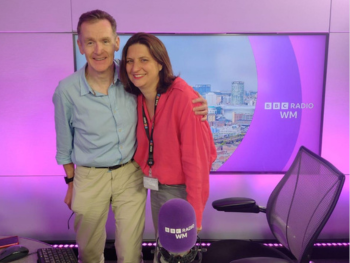University News Last updated 11 July 2024

BCU's political economist, Dr Steve McCabe spent more than 12 hours live on air once the polls had closed on the 2024 General Election, commentating on the results. He shares what the experience was like and what kept him going!
A general election is one of the most exciting times for political boffins such as myself. And, after 6 weeks of campaigning, the day is finally upon us: Thursday 4th July.
Waking up that morning, there was undoubtedly the sense that the election was going to change things. The opinion polls had all be pointing to a huge Labour victory, but the only vote that truly counts is the one where people cast it in primary schools, church halls and community centres across the UK.
But last week’s election was even more memorable for me as I spent over 12 hours in BBC Radio WM’s studio in Birmingham, commentating on the results as they came in. I worked with three wonderful presenters and their producers over that time, in a bubble of election results.
The first big moment was at 10pm on Thursday 4th July, when the exit poll was published. As the news bulletin was being read out, I was trawling through the exit poll before the first presenter of the night, Warren Moore, came on air.
Between calls with reporters at different counts across the West Midlands, I was looking at the data until the first result was called out. After an hour and a half, the election results started as it meant to go on with Labour’s Bridget Phillipson retaining her seat in Houghton and Sunderland South. It also meant I had to start rationing the chocolate.
Four hours after the exit poll was announced, and it was now the turn of presenter Kath Stanczysyn to take the seat. “Only another 630 results to go!” I announced with glee to Kath after a slow start. This period allowed us to witness that the complexion of seats in the local area were, in some cases, resulting in surprise results and that the combination of the Reform UK party and independent candidates were proving that contemporary British politics is nothing if not unpredictable and volatile.
By the time the breakfast show with Sarah Julian (pictured with myself) comes around, we’re on to the final straight. The last four hours of coverage. I hope no one can hear me munching on a croissant over the airwaves.
I found those final hours the most fascinating. The result of the Birmingham seats showed that Labour can take nothing for granted and that huge majorities count for little. Indeed, Perry Barr surprisingly elected an independent, the first time this has occurred in the West Midlands since 1945.
By the time I leave the BBC at 10am, I’m also getting messages from Hits Radio and Capital FM. Whatsapp voice notes have become a handy tool for quickly sending audio comments to radio stations, which means I can fire off a quick round of commentary before my final stop: Birmingham TV.
After that interview I can finally take it in. This morning feels different to waking up the day before.
If the next five years is characterised by collective improvement in the economic prosect of every citizen, most particularly the underprivileged and disadvantaged, then things really will have changed for the better.